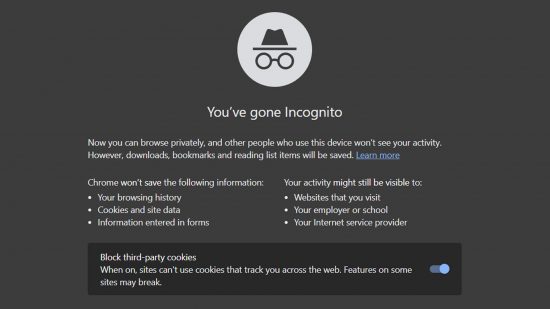Google has finally updated the disclaimer on the Incognito Mode of its Chrome browser to more accurately reflect the data that it still collects from users. This Google Chrome Incognito Mode update follows a class action lawsuit that sought $5 billion in punitive damage on behalf of users previously hoodwinked into thinking Incognito Mode was truly private.
The lawsuit concluded last year, with Google settling for an undisclosed sum – so we don’t actually know quite how much Google has paid out or will have to pay out. It’s a reasonable bet that the sum will be considerably less than the $5 billion that was sought but it’s an equally fair guess that it runs into the many millions.
Whatever the actual payment, following the decision Google has finally now tweaked the language used in the disclaimer shown when users first open an Incognito Mode window in Chrome.
On most current builds of Chrome, the disclaimer says “Now you can browse privately, and other people who use this device won’t see your activity. However, downloads, bookmarks, and reading list items will be saved.”

The updated text, that is being included in the early-release Canary build of the browser, the text reads, “Others who use this device won’t see your activity, so you can browse more privately. This won’t change how data is collected by website you visit and the services they use, including Google. Downloads, bookmarks, and reading list items will be saved.”
For comparison’s sake, Firefox’s current Privacy Window disclaimer says simply, “Firefox clears your search and browsing history when you close all private windows. This doesn’t make you anonymous.” Considering quite how succinct and clear Firefox’s language is, we’d say there’s still room for improvement from Google.
Of course, if you’re really paranoid about data tracking, there are web browser entirely dedicated to purging your internet access of such things. Firefox is decent when it comes to that stuff but the likes of Brave (Chromium-based) and Librewolf (Firefox-based) provide a completely dedicated, privacy-oriented experience while the Tor browser goes a step further with dedicated “onion routing” used to anonymize the user.
You can also circumvent a fair amount of tracking shenanigans by using a VPN, as a lot of tracking information is based on your IP and associated location. You can check our list of the best VPNs for our current recommendations.
